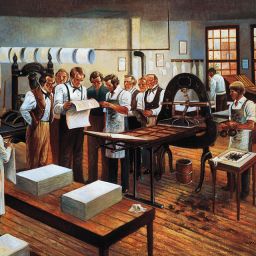As we read through Alma 54, Mormon tells the story of Moroni fighting the Lamanites and dealing with the loss of his Nephites as well as the problem of the Lamanite prisoners he held. Here’s the verse:
“Now the Lamanites had taken many women and children, and there was not a woman nor a child among all the prisoners of Moroni, or the prisoners whom Moroni had taken; therefore Moroni resolved upon a stratagem to obtain as many prisoners of the Nephites from the Lamanites as it were possible.”
Why did he make that correction? He had been clear, hadn’t he? If writing involved scraping letters into metal plates, adding that extra few words would have been time consuming, and he had been clear enough in the earlier part of the sentence, right? “Not a woman nor a child among all the prisoners of Moroni.” Makes sense, so why clarify with “or the prisoners whom Moroni had taken?”
Take a look at the later reference to prisoners in the same verse: “Moroni resolved upon a stratagem to obtain as many prisoners of the Nephites from the Lamanites as it were possible.”Wait a minute. Prisoners of the Nephites? The Lamanites are the prisoners of the Nephites. Mormon is obviously talking about Nephite prisoners, so why does he say “prisoners of the Nephites” instead? Moreover why doesn’t he correct this obvious mistake?
Why correct “prisoners of Moroni” when it makes perfect sense, but not correct “prisoners of the Nephites” when it doesn’t make sense?
Problems with Prisoners
The “prisoners of the Lamanites” phrase comes up several times in Mormon’s writing, always referring to Lamanite prisoners held by Nephites. In general, the reader understands that Mormon’s “of” means something like “from” or “out of” and not “belonging to.” However it causes a certain amount of awkwardness, and could easily cause misunderstanding were it not for context. Yet Mormon’s phrase “prisoners of Moroni” is easy to understand, and not likely to cause misunderstanding. But Mormon feels the need to clarify his meaning. Why? Clearly he felt that “prisoners of Moroni” could cause confusion, otherwise he wouldn’t spend the time laboriously scraping letters into metal plates. Thus it would seem that, for Mormon, the “of” in these prisoner statements always meant something like “from” or “out of” or as a descriptor connection rather than just a possession connection.
In other words, when talking about prisoners, the word we call “of” might be better translated as “of type.” For example “prisoners [of type] Lamanite.” or “prisoners [of type] Nephite.” With that in mind, the phrase “prisoners of Moroni” becomes almost nonsensical in that form. “prisoners [of type] Moroni” seems like a group of prisoners, all of whom were Moroni.
Construct State
What we’re seeing here is an example of something called the “Construct State.” In Hebrew, as well as in a few other languages, two nouns are connected with the descriptive word second. This is different from English, where we usually put the descriptive word first. For example, an iron rod, or a brick house, or a metal car. In the Hebrew it would be “rod iron,” or “house brick,” or “car metal.” Thus, when translated from Hebrew to English, if word order is preserved an “of” is added for clarity. “rod of iron” “house of brick” “car of metal.”In the case of the prisoners, Mormon was writing something like “prisoners Lamanites.” To him this was a clear description: Prisoners who were Lamanite. But when he wrote “prisoners Moroni” he realized it could be taken as a mistake – as “prisoners who were Moroni.” Thus the need to clarify.
Weaknesses to Strengths
Mormon’s mistake becomes an asset to us today. By taking the time to clarify what he wrote when he felt he had done wrong, it shows the consistency of his language in all the places where he didn’t make a mistake, and gives us strong evidence of translation from Hebrew to English because of it.







Great post Greg, I have pondered this verse and couldn’t really come up with a good explanation.
I appreciate your careful comparison with other examples. This makes sense.